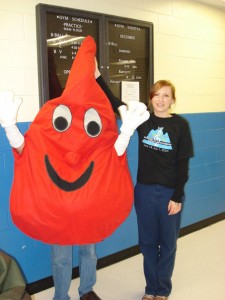Being a “student leader”.

One of the largest groups of student leaders on campus, Resident Assistants hold significant authority in the residential setting. That's me at the back left. I led the good people of the Honors Program frehsman house.
It’s a head-inflating phrase. For those kids who list more jobs than hobbies on resumes and social network sites. You know, the ones who always have “meetings” to go to and “events” to put on. When your official titles out-number your Facebook list of favorite movies, you have a problem.
I have that problem.
I could rattle off all my lofty credentials, but that might be counterproductive to my point. So, let’s just assume I’m the snub-nosed, over-achieving antagonist on a hypothetical episode of Recess who has ruled the student government, lacrosse team, marching band, and honors society for all of elementary school.
I spend my lunch hour scouring the hallways for underlings to condescend and menial favors to be done that will make the administration like me (and boost my own ego) . Meanwhile Vince and Spinelli are out getting vitamin D and learning life lessons.

Student leaders also frequently get matching shirts. Some of my favorite past and present student leaders: the student staff of Multicultural Student Services and the Office of Spirituality, Service ad Social Justice (and our bosses).
Clearly, through my leadership experience I have gained important skills like respect for authority and understanding of power differentials. I’ve even amassed a hefty amount of self-esteem that should last me well through the dark ages of middle school, though perhaps at the cost of a little thing called perspective.
Being toted about as a “student leader” can instill in one not necessarily a false but, perhaps, a heightened sense of self-importance. I start feeling like it must be harder to be me than those “non-student-leaders”, and rolling my eyes at all the “stuff” they have to do. Try adding leading three club meetings, working five jobs, sitting in on nineteen committees, and writing a list of personal demands to Principal Ron Thom every week too. (Before his time as president of Puget Sound, the Thom did some time as a fictional elementary school administrator). But this amplification of self-worth through titles and over-involvement isn’t of mysterious origin. It is a learned behavior.

I was even a student leader in high school. As an officer of our National Honors Society I organized the blood drives with our local blood bank. Under my reign they let us borrow Buddy the blood drop.
Growing up through the public education system, the private university admission process, and the jam-your-resume-with-as-much-as-possible mentality, there has always been huge weight put on how much stuff you can do. And not just how much, but who knows about it. You can’t just spend all your time writing poetry for the sake of getting better at writing poetry or expressing what you think about in fun ways. You have to join the poetry club and enter the poetry contest and host a poetry reading in order to be a kid who “does poetry”. As if there is some necessity to legitimize the practice or confirm that you actually “do” poetry by the approval or supervision of some outside source. And if you really want to “do” poetry, you should probably be president and win the contest too. Just in case. We are trained to seek out the highest and most recognized means of participation. That’s what will get us accepted to this school or that program. That’s what will set us apart. That’s what makes us “better” than the kids who “just” write poetry.
Personally, I’m a fan of “leadership”. Having the authority and resources to make things happen the way I want them to is pretty nice. But the result of successfully implementing a cool idea doesn’t have to be the desire for more control or the need for an approving pat on the head by the cosmic distributor of self-worth.
As the real Mary Krauszer, senior in college and student leader, this is a constant struggle. I have to work at deflating my own cartoon-sized, student-leader head: appreciating leadership as an opportunity to positively affect my peers; developing self-importance not from what I do, or how it sounds, but from who I am and why I find value in being a “student leader”; decoupling self-worth from an exhaustive list of official titles. I’m getting there.
Plus, there just aren’t any movies worth listing other than Galaxy Quest and Kung Fu Panda.

The time the university sent me to Washington DC as a student delegate for a national conference. We rode back from the airport in a limo. NBD.
Note: I’m not accusing any of the other student leaders at this or any other institution of suffering from the same “leadership” side effects that I do. Namely, you’re not all pretentious caricatures. It’s more of a generalized self-reflection. Dangerous, I know. But maybe it’s all just because I’m a youngest child.
I would also like to point out that Mike Segawa knew I was a control freak almost a year before I did. Mike is the Dean of Students. He administered a “work styles” test during one of my “student leader” training sessions. My style: Controller. The more you know about yourself…
I apologize for the over-use of quotes and hyphens.

